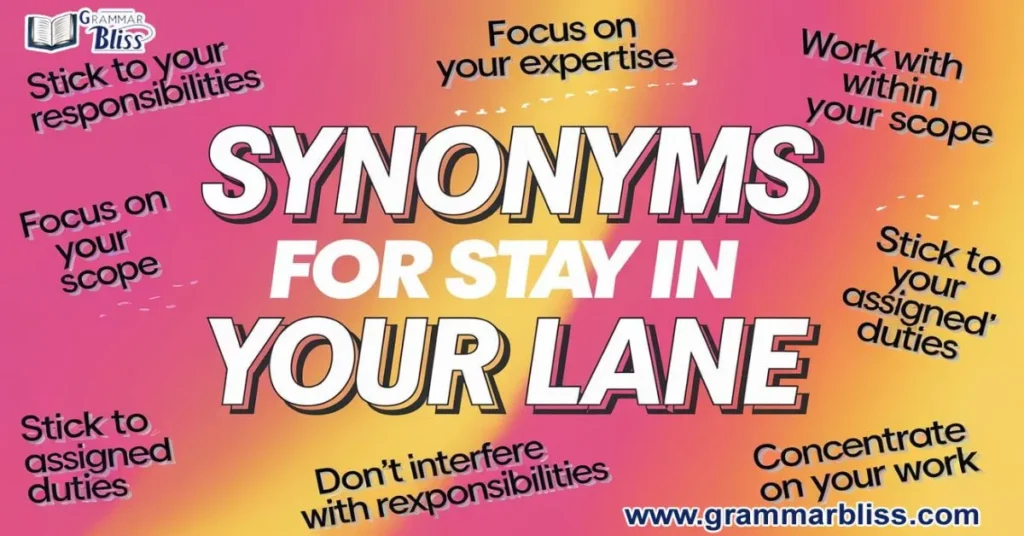In today’s professional environment, effective communication is key to maintaining smooth workflows and strong relationships. One phrase that often arises in workplace conversations is “Stay in Your Lane”. While it may be used to redirect someone or establish role boundaries, it can also come across as harsh or dismissive if not communicated carefully.
The key to effective communication is being respectful and clear while maintaining professionalism. Here, we’ll explore the meaning of “Stay in Your Lane”, its professional use, and the best alternatives to ensure polite communication and respectful interaction in the workplace, ensuring focus on roles, responsibilities, and task management.
Quick Summary
The phrase “stay in your lane” is often used when someone is advised to stick to their area of expertise, avoid overstepping boundaries, or focus on their responsibilities. While this phrase can sometimes be helpful, it can also come off as harsh or rude, especially in a professional environment. Understanding how to use it appropriately can help in maintaining workplace relationships and ensure respectful communication. In this guide, we will break down its meaning, explore when it’s appropriate to use, and offer alternatives to keep things professional and respectful.
Read: 20-examples-of-present-tense-guide-to-simple-present-tense/
Meaning of: Stay in Your Lane

“Stay in your lane” originally comes from the world of driving. It refers to staying within your designated lane on the road. However, in workplace communication, it has evolved into a metaphor, meaning to stay focused on one’s own responsibilities or area of expertise. Essentially, it suggests that people should refrain from getting involved in tasks or conversations outside their scope.
The phrase implies a boundary. When someone is told to “stay in their lane,” it often means that they should not interfere with areas where they lack knowledge or experience. While this is meant to encourage role alignment and focus, it can be interpreted as a directive or even a reprimand, depending on the tone and context.
Usage of: Stay in Your Lane
In workplace culture, “stay in your lane” is commonly used to redirect someone who may be overstepping their role boundaries or offering unsolicited advice. For example, if a marketing professional starts suggesting changes to the technical aspects of a project, a colleague might say, “That’s outside your scope. Let’s focus on your expertise in marketing.” The phrase helps ensure that everyone is focused on their task responsibilities and not getting involved in areas where they don’t have expertise.
However, it’s important to use the phrase carefully. In some situations, saying “stay in your lane” can come off as dismissive or condescending, especially if it is used in a public setting or without context. This can negatively impact team dynamics and create defensiveness. It’s always important to communicate the message with respect, clarity, and polite communication to avoid creating tension.
Stay in Your Lane: Is It Professional to Say?
While “stay in your lane” may be useful for clarifying roles and keeping the team focused, it isn’t always the best choice in a professional environment. The phrase can sound abrupt, or even rude, if not delivered tactfully. In workplace communication, it’s crucial to maintain a professional tone and avoid language that may seem disrespectful.
For instance, telling someone to “stay in their lane” during a meeting may damage the rapport and create an uncomfortable atmosphere. It’s important to set boundaries without crossing into rude language or creating conflict. A more polite way to convey the same idea would be to say, “Let’s focus on our areas of responsibility” or “This task falls outside your scope, but I appreciate your input.”
Effective conflict resolution often involves redirecting conversations or tasks without undermining someone’s contributions. By using clear communication and maintaining respectful communication, you can keep conversations productive without offending anyone.
Advantages and Disadvantages of Saying “Stay in Your Lane”
The phrase “stay in your lane” has its pros and cons, particularly when used in the workplace. Understanding when to use it—and when to avoid it—can help you navigate conversations more effectively.
Advantages:
- Directness: It’s clear and straightforward, which can help keep the conversation on track.
- Focus: By setting role boundaries, it helps people stay on their task responsibilities, ensuring that each team member focuses on their area of expertise.
- Task Management: It helps prioritize tasks and avoid unnecessary distractions.
Disadvantages:
- Rude Tone: If not communicated respectfully, it can come across as dismissive or harsh.
- Defensiveness: Telling someone to “stay in their lane” may lead to defensive reactions, especially if the person feels they are being criticized or ignored.
- Damage to Relationships: Overuse of the phrase can harm work relationships, leading to a lack of collaboration and teamwork coordination.
While it’s important to stay focused on one’s role and responsibilities, it’s equally essential to communicate with respect and maintain a productive environment. In many cases, redirecting someone with understanding and tact is far more effective.
Learn: greatful-or-grateful-learn-the-correct-spelling/
Synonyms for Stay in Your Lane

To avoid sounding confrontational, there are many alternative phrases you can use to convey the same message while maintaining a professional tone. Here are some options:
Stick to Your Responsibilities
- Meaning: Focus on your assigned duties or tasks.
- Example: “Please stick to your responsibilities and let me handle the client meeting.”
Focus on Your Expertise
- Meaning: Concentrate on the areas where you have knowledge or skill.
- Example: “Let’s focus on your expertise in marketing, and I’ll handle the technical aspects.”
Respect Role Boundaries
- Meaning: Acknowledge the limitations of your role and stay within those limits.
- Example: “It’s important to respect role boundaries to avoid stepping on others’ toes.”
Concentrate on Your Job
- Meaning: Focus entirely on the tasks that fall under your role.
- Example: “Please concentrate on your job, and I’ll take care of the administrative tasks.”
Stay in Your Area of Responsibility
- Meaning: Stick to the tasks that fall within your duties.
- Example: “Let’s stay in your area of responsibility and not distract from the current project.”
Work Within Your Scope
- Meaning: Stick to tasks that align with your current duties or job.
- Example: “You should work within your scope and leave the financial analysis to the finance team.”
Keep to Your Job Description
- Meaning: Perform the duties listed in your job role.
- Example: “I think it’s best if we all keep to our job description to avoid confusion.”
Don’t Overstep Your Bounds
- Meaning: Avoid stepping beyond your designated role or responsibilities.
- Example: “It’s important not to overstep your bounds, especially when dealing with client issues.”
Stay Aligned With Your Role
- Meaning: Focus on the tasks aligned with your position.
- Example: “Let’s stay aligned with your role in customer service while I handle the backend support.”
Stick to Your Assigned Duties
- Meaning: Only handle the responsibilities that were given to you.
- Example: “Please stick to your assigned duties and avoid taking on tasks outside of your department.”
Respect Your Area of Expertise
- Meaning: Acknowledge and work within the limits of your professional skills.
- Example: “We should respect your area of expertise in design and leave the coding to IT.”
Keep to Your Assigned Role
- Meaning: Stick to the specific tasks or duties assigned to you.
- Example: “Let’s keep to your assigned role and focus on the marketing strategy.”
Don’t Interfere with Others’ Responsibilities
- Meaning: Avoid getting involved in others’ tasks or duties.
- Example: “It’s better not to interfere with others’ responsibilities unless asked for help.”
Focus on What You’re Good At
- Meaning: Stick to tasks that match your strengths and skills.
- Example: “Let’s focus on what you’re good at—organizing events—while I manage the budget.”
Work Within Your Expertise
- Meaning: Stick to tasks that match your professional knowledge or training.
- Example: “You should work within your expertise in HR and let the legal team handle the compliance issues.”
Concentrate on Your Work
- Meaning: Stay focused on the tasks assigned to you.
- Example: “Please concentrate on your work while I discuss the project’s details with the client.”
Focus on What’s Within Your Purview
- Meaning: Stick to what falls within your area of responsibility.
- Example: “Let’s focus on what’s within your purview and leave the operations to me.”
Stick to What’s Relevant to You
- Meaning: Avoid getting involved in matters that don’t concern you directly.
- Example: “It’s best to stick to what’s relevant to you and leave the budget discussions to finance.”
Limit Yourself to Your Tasks
- Meaning: Stick to handling only the work assigned to you.
- Example: “Please limit yourself to your tasks and let me take care of the client interactions.”
Stay Within Your Job Role
- Meaning: Perform tasks that are part of your designated role.
- Example: “Let’s stay within your job role and avoid stepping into the areas of other departments.”
Avoid Overstepping Your Responsibilities
- Meaning: Refrain from taking on more tasks than those assigned to you.
- Example: “Avoid overstepping your responsibilities by focusing on your current workload.”
Respect Organizational Boundaries
- Meaning: Acknowledge the limits set by the organization in terms of your responsibilities.
- Example: “Let’s respect organizational boundaries and focus on our individual team goals.”
Mind Your Own Business
- Meaning: Don’t get involved in matters outside your duties.
- Example: “It’s important to mind your own business and let others handle their tasks.”
Don’t Step Out of Your Lane
- Meaning: Stick to what you know and avoid going beyond your role.
- Example: “Please don’t step out of your lane; focus on the tasks related to your department.”
Avoid Taking on Other People’s Tasks
- Meaning: Stick to your tasks and don’t take over other people’s responsibilities.
- Example: “It’s better to avoid taking on other people’s tasks and concentrate on your assigned duties.”
Stay Focused on Your Role
- Meaning: Focus on the duties assigned to you and avoid distractions.
- Example: “Let’s stay focused on your role and handle the current project at hand.”
Stick to Your Expertise
- Meaning: Stick to areas where you are knowledgeable and skilled.
- Example: “You should stick to your expertise in design, while I manage the marketing strategy.”
Maintain Professional Boundaries
- Meaning: Respect the boundaries of your professional role.
- Example: “We need to maintain professional boundaries to ensure that everyone knows their responsibilities.”
Adhere to Your Assigned Role
- Meaning: Follow the tasks and responsibilities designated for your role.
- Example: “Please adhere to your assigned role and focus on completing your tasks before helping others.”
Stay Within Your Professional Role
- Meaning: Focus on tasks that belong to your professional scope.
- Example: “Let’s stay within your professional role, and I’ll take care of the project management.”
Keep to Your Designated Tasks
- Meaning: Stick to the specific duties assigned to you.
- Example: “Keep to your designated tasks and allow the team to handle the project development.”
Limit Yourself to Your Responsibilities
- Meaning: Avoid overextending beyond what has been assigned to you.
- Example: “It’s best to limit yourself to your responsibilities and leave the strategy planning to the team leaders.”
Stay Within Your Designated Area
- Meaning: Stick to the tasks or areas assigned to you.
- Example: “Let’s stay within your designated area and handle the creative side of the project.”
Focus on What You Can Control
- Meaning: Stick to aspects that fall within your ability to manage or influence.
- Example: “You should focus on what you can control—your marketing campaigns—and I’ll manage the operations.”
Avoid Overreaching
- Meaning: Avoid taking on too much or extending beyond your role.
- Example: “Avoid overreaching by concentrating on your current responsibilities instead of trying to take on more.”
Stick to What’s in Your Job Scope
- Meaning: Perform only the tasks that are part of your job description.
- Example: “Let’s stick to what’s in your job scope and not get involved in tasks outside your role.”
Stay in Your Job Lane
- Meaning: Stick to the role or tasks that match your job title or position.
- Example: “Let’s stay in your job lane and leave the strategic planning to the leadership team.”
Be Mindful of Your Work Boundaries
- Meaning: Acknowledge and respect the boundaries of your responsibilities.
- Example: “Be mindful of your work boundaries to ensure that we work efficiently as a team.”
Avoid Crossing into Other Roles
- Meaning: Refrain from interfering with tasks or areas outside your role.
- Example: “You should avoid crossing into other roles and focus on completing the tasks assigned to you.”
Stay Within Your Assigned Limits
- Meaning: Stick to the limits of your role and avoid stepping outside of them.
- Example: “Stay within your assigned limits to avoid confusion and ensure smooth collaboration.”
Explore: jesss-or-jess-understanding-possessive-apostrophes/
Grammar Rules and Example
The phrase “stay in your lane” is a command or directive, and as such, it is usually used in the imperative form. It can be used both formally and informally, but the tone matters. In the workplace, it’s important to remember that respectful communication is key.
For Example:
- Correct usage: “I think we should stay focused on our responsibilities today.”
- Incorrect usage (rude): “Stay in your lane—this is my job, not yours.”
Notice how the second example feels like a reprimand rather than a respectful redirection. In professional settings, you should aim to communicate boundaries politely and without using rude language.
FAQ’s
What does “Stay in Your Lane” mean in a professional setting?
It means focusing on your assigned responsibilities and avoiding overstepping into others’ roles.
Is it rude to say “Stay in Your Lane” at work?
Yes, it can sound harsh; it’s better to use more respectful, clear alternatives to set boundaries.
How can I professionally redirect someone at work?
You can suggest focusing on their expertise or staying aligned with their specific responsibilities.
Why is it important to set boundaries in the workplace?
Setting boundaries ensures clarity in roles, improves team collaboration, and prevents conflicts.
What are some alternatives to “Stay in Your Lane”?
Alternatives include phrases like “focus on your role” or “let’s stick to our responsibilities.”
Conclusion
While the phrase “Stay in Your Lane” can help establish boundaries and clarify roles, it’s essential to use it thoughtfully in a professional environment. By focusing on respectful communication and ensuring clarity in role definition, you can avoid misunderstandings and maintain positive work relationships. Instead of sounding confrontational, opt for alternative expressions that foster team collaboration and clear task prioritization. Ultimately, maintaining professionalism and a positive work culture helps ensure a productive and respectful environment for everyone involved.

